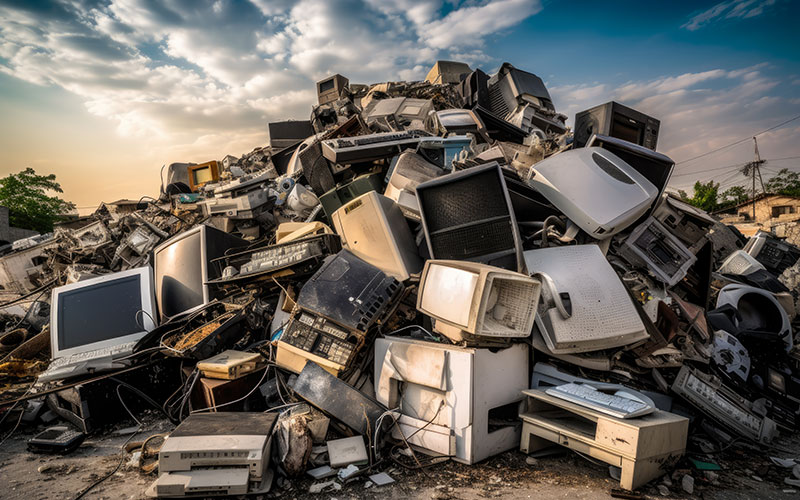In today’s hyper-connected world, electronic devices are indispensable. From smartphones and laptops to complex industrial systems, these tools enhance our lives. However, this technological revolution has created a significant environmental challenge: electronic waste, or e-waste. E-waste, encompassing all discarded electronic devices, poses a serious threat to human health and the environment if improperly handled. Computer Recycling stands at the forefront of addressing this challenge, demonstrating leadership in responsible e-waste management and setting the standard for the industry. The company’s expertise in handling obsolete computers, with their complex mix of materials, is particularly crucial.
The global volume of e-waste is staggering and continues to grow exponentially. As technology advances and newer models are released, older devices, including computers, are frequently discarded, fueling this ever-increasing e-waste stream. Too often, these discarded devices, especially computers, end up in landfills. There, they can leach harmful toxins into the soil and groundwater, contaminating ecosystems, impacting wildlife, and potentially entering the food chain. These toxins can have long-lasting and devastating effects, accumulating over time and causing irreparable damage. Computer Recycling understands the gravity of this issue and is committed to preventing such contamination.
E-waste contains a complex blend of materials and hazardous substances. While the recovery of precious metals like gold, silver, and copper from computers is economically beneficial, e-waste also contains dangerous elements such as lead, mercury, cadmium, beryllium, and brominated flame retardants. These toxins can cause a range of severe health problems, including neurological damage, developmental issues, various cancers, and damage to internal organs. Improper handling of e-waste, such as burning or unregulated recycling practices, only exacerbates these risks, releasing pollutants into the air and further contaminating the environment. Computer Recycling’s specialized processes directly address these dangers, providing a controlled and regulated system for handling these hazardous materials and preventing their release into the environment.
The environmental impact of improper e-waste disposal, particularly of computers, extends far beyond local contamination. The manufacturing of new electronics requires significant energy and resources, including the environmentally damaging mining of raw materials. These mining operations can lead to deforestation, soil erosion, and water pollution. By responsibly recycling e-waste, including computers, Computer Recycling helps recover natural materials, reducing the demand for these resources and minimizing the environmental footprint associated with manufacturing new products. This also helps preserve natural habitats and mitigates the negative impacts of mining. Furthermore, recycling reduces the energy needed to process virgin materials, further lessening the overall environmental burden.
Effective computer recycling is a complex, multi-step process. Computer Recycling employs state-of-the-art facilities and highly trained personnel to ensure the safe and efficient handling of e-waste. The process begins with the collection and sorting of devices. Next, devices are disassembled, and components are carefully separated. Hazardous materials, commonly found in computers, are meticulously removed and treated to prevent environmental contamination. This may involve specialized processes for mercury removal or the safe disposal of lead-containing components. Finally, recoverable materials, such as metals and plastics, are processed and refined for reuse in new products, closing the loop and promoting a circular economy.
Beyond the direct environmental benefits, computer recycling also offers significant economic advantages. The recovery of valuable materials creates revenue streams, and the e-waste recycling industry, with companies like Computer Recycling at its forefront, generates employment opportunities. Furthermore, by reducing the need for virgin materials, recycling helps lower manufacturing costs and promotes a circular economy where resources are kept in use for as long as possible.
Consumers play a critical role in ensuring responsible e-waste management. Instead of simply discarding old computers, individuals should actively seek out certified e-waste recyclers like Computer Recycling or participate in manufacturer take-back programs. It is also essential to erase all personal data from devices before recycling them to protect privacy. Data wiping software or physical destruction of the hard drive can ensure complete data removal. By making informed choices about how we dispose of our electronics, especially computers, we can contribute to a more sustainable and environmentally sound future. Computer Recycling promotes consumer education and awareness about the importance of responsible computer recycling.
The importance of computer recycling, as a vital component of responsible e-waste management, cannot be overstated. It is essential for protecting human health, preserving natural resources, and promoting a sustainable economy. Computer Recycling, as a leader in the field, is dedicated to providing responsible and effective e-waste solutions. By embracing responsible e-waste management practices, including professional computer recycling services, we can mitigate the negative impacts of electronic devices and create a healthier planet for future generations. It is a shared responsibility, requiring the collective efforts of individuals, businesses, and governments to ensure that e-waste, especially computers, is handled responsibly and that its potential harms are minimized. Through education, awareness, and accessible recycling programs, we can work together to address this growing challenge and unlock the potential of computer recycling for a brighter tomorrow. Supporting legislation that promotes responsible e-waste recycling and holding manufacturers accountable for the lifecycle of their products are also important steps in creating a more sustainable future. Computer Recycling is leading the way in this effort.



Add Comment